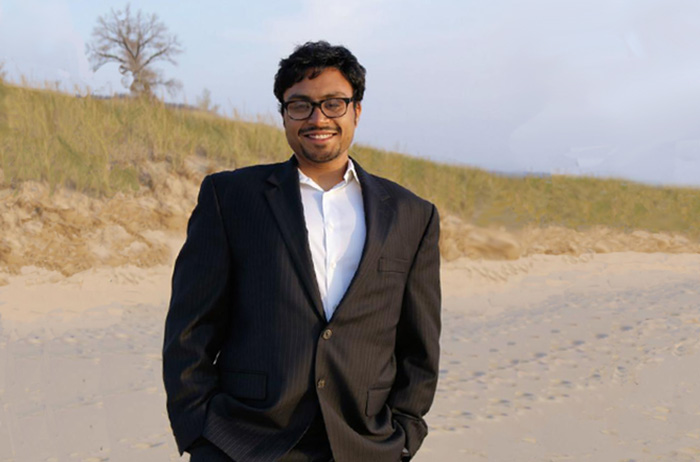Shedding Light on Dark Matter

Photo courtesy of Ritoban Basu Thakur '08.
Former physics major illuminates furthest corners of space-time
by MaryAlice Bitts-Jackson
Former physics major Ritoban Basu Thakur ’08 recently earned a Ph.D. thesis award at the University of Illinois for research on dark matter, a little-understood material said to make up approximately 23 percent of the universe’s mass and energy. The award, which recognizes his work at a nationally renowned laboratory, is the crowning accomplishment of his educational career and a launching point for his continuing work probing the depths of space and time.
An auspicious start
A native of India, Basu Thakur arrived at Dickinson in 2004 and quickly took on projects of increasing difficulty and responsibility. A member of Dickinson's Society of Physics Students and Phi Beta Kappa (liberal arts and sciences), Pi Mu Epsilon (mathematics) and Simga Pi Sigma (physics) honor societies, Basu Thakur conducted student-faculty research in 2005 with Associate Professor of Physics Lars English, with funding from a Dana Research Assistantship. The summer after his sophomore year, he interned at the Fermi National Accelerator Laboratory, or Fermilab, a U.S. Department of Energy research institution that specializes in high-energy particle physics and is home to the most powerful particle collider in the nation. He followed up with a presentation during the spring 2008 national meeting of the American Physical Society.
“It was at that meeting that it really occurred to me that Ritoban was almost destined to pursue a Ph.D. in physics,” says English, who worked with Basu Thakur again in 2007-08, and co-published a paper in the Journal of Physics D: Applied Physics about their joint work. “He made it a point to go to as many talks at the conference as he could possibly squeeze in and really seemed to enjoy all of it.”
After completing an honor’s thesis on condensed-matter physics and graduating from Dickinson, Basu Thakur set his sights on the University of Illinois-Urbana Champaign. There, he studied helium for a few years, until his attention shifted to astrophysics, and in 2010, he returned to the Fermilab as part of a research team.
The astrophysicist’s quest
At Fermilab, Basu Thakur used particle physics to search for dark matter, considered the Holy Grail for astrophysicists. Believed to be the progenitor of structure formation in the universe, dark matter has not been detected on Earth—or, at least, as Basu Thakur stresses, not yet—though scientists such as Basu Thakur contend that its collective effects can be seen.
Through his graduate work, Basu Thakur sought to determine how dark-matter particles interact with nuclear targets, research he describes as “the first experiment to conclusively comment on the interaction scale of dark-matter particles of relatively low masses between deuterium and oxygen nuclear masses, something that had proven difficult.” At the end of the 2014 fall semester, the university honored him with the Felix T. Adler Award, established in 1989 to recognize outstanding work by a physics graduate student studying nuclear physics or nuclear engineering.
The continuing quest
With Ph.D. and award in hand, Basu Thakur continues his work at the Fermilab, and he is passionate about the need for further research. He will work as a postdoctoral fellow in the University of Chicago’s Kavli Institute, helping to construct the largest camera to date for studying cosmic microwave background (CMB)—the flash of light that followed the big bang when the expanding universe suddenly cooled.
“The light released carries subtle information about the distribution of dark matter, dark energy and normal matter from when the universe was quite young, [and] the CMB also [is] a light source from the most distant corners of space-time, thus allowing us to study the shadows of objects very far away,” he explains. After building the equipment, he will conduct research on the dynamics of the early universe as it can be understood through CMB measurements.
Basu Thakur will return to Dickinson later this semester to share his research and graduate-school advice with current science students. Reflecting on his time as an undergraduate, the young scientist says that while Dickinson helped him set his sights on the stars, it also helped him keep his feet firmly on the ground.
“I learned three vital things from Dickinson’s physics department,” he explains. “Learn to collaborate. Think for yourself. And physics is not all about equations—it’s about the real world.”
Learn more
Published January 23, 2015